- Home
- Thomas Harris
Hannibal Page 2
Hannibal Read online
Page 2
“We’re doing the door how?” Starling said.
Burke spoke up. “If it sounds quiet, the ram. If we hear flash-bangs or gunfire, it’s ‘Avon calling.’” Burke patted his shotgun.
Starling had seen it done before—“Avon calling” is a three-inch magnum shotgun shell loaded with fine powdered lead to blow the lock out without injuring people inside.
“Evelda’s kids? Where are they?” Starling said.
“Our informant saw her drop them off at day care,” Brigham said. “Our informant’s close to the family situation, like, he’s very close, as close as you can get with safe sex.”
Brigham’s radio chirped in his earphone and he searched the part of the sky he could see out the back window. “Maybe he’s just doing traffic,” he said into his throat microphone. He called to the driver, “Strike Two saw a news helicopter a minute ago. You seen anything?”
“No.”
“He better be doing traffic. Let’s saddle up and button up.”
One hundred and fifty pounds of dry ice will not keep five humans cool in the back of a metal van on a warm day, especially when they are putting on body armor. When Bolton raised his arms, he demonstrated that a splash of Canoe is not the same as a shower.
Clarice Starling had sewn shoulder pads inside her fatigue shirt to take the weight of the Kevlar vest, hopefully bulletproof. The vest had the additional weight of a ceramic plate in the back as well as the front.
Tragic experience had taught the value of the plate in the back. Conducting a forcible entry raid with a team you do not know, of people with various levels of training, is a dangerous enterprise. Friendly fire can smash your spine as you go in ahead of a green and frightened column.
Two miles from the river, the third van dropped off to take the DEA incursion team to a rendezvous with their fishing boat, and the backup van dropped a discreet distance behind the white undercover vehicle.
The neighborhood was getting scruffy. A third of the buildings were boarded up, and burned-out cars rested on crates beside the curbs. Young men idled on the corners in front of bars and small markets. Children played around a burning mattress on the sidewalk.
If Evelda’s security was out, it was well concealed among the regulars on the sidewalk. Around the liquor stores and in the grocery parking lots, men sat talking in cars.
A low-rider Impala convertible with four young African-American men in it pulled into the light traffic and cruised along behind the van. The low-riders hopped the front end off the pavement for the benefit of the girls they passed and the thump of their stereo buzzed the sheet metal in the van.
Watching through the one-way glass of the back window, Starling could see the young men in the convertible were not a threat—a Crip gunship is almost always a powerful, full-sized sedan or station wagon, old enough to blend into the neighborhood, and the back windows roll all the way down. It carries a crew of three, sometimes four. A basketball team in a Buick can look sinister if you don’t keep your mind right.
While they waited at a traffic light, Brigham pulled the cover off the eyepiece of the periscope and tapped Bolton on the knee.
“Look around and see if there are any local celebrities on the sidewalk,” Brigham said.
The objective lens of the periscope is concealed in a roof ventilator. It only sees sideways.
Bolton made a full rotation and stopped, rubbing his eyes. “Thing shakes too much with the motor running,” he said.
Brigham checked by radio with the boat team. “Four hundred meters downstream and closing,” he repeated to his crew in the van.
The van caught a red light a block away on Parcell Street and sat facing the market for what seemed a long time. The driver turned as though checking his right mirror and talked out of the corner of his mouth to Brigham. “Looks like not many people buying fish. Here we go.”
The light changed and at 2:57 P.M., exactly three minutes before zero hour, the battered undercover van stopped in front of the Feliciana Fish Market, in a good spot by the curb.
In the back they heard the ratchet as the driver set the hand brake.
Brigham relinquished the periscope to Starling. “Check it out.”
Starling swept the periscope across the front of the building. Tables and counters of fish on ice glittered beneath a canvas awning on the pavement. Snappers up from the Carolina banks were arranged artfully in schools on the shaved ice, crabs moved their legs in open crates and lobsters climbed over one another in a tank. The smart fishmonger had moisture pads over the eyes of his bigger fish to keep them bright until the evening wave of cagey Caribbean-born housewives came to sniff and peer.
Sunlight made a rainbow in the spray of water from the fish-cleaning table outside, where a Latin-looking man with big forearms cut up a mako shark with graceful strokes of his curved knife and hosed the big fish down with a powerful handheld spray The bloody water ran down the gutter and Starling could hear it running under the van.
Starling watched the driver talk to the fishmonger, ask him a question. The fishmonger looked at his watch, shrugged, pointed out a local lunch place. The driver poked around the market for a minute, lit a cigarette and walked off in the direction of the café.
A boom box in the market was playing “Macarena” loud enough for Starling to hear it clearly in the van; she would never again in her life be able to endure the song.
The door that mattered was on the right, a double metal door in a metal casement with a single concrete step.
Starling was about to give up the periscope when the door opened. A large white man in a luau shirt and sandals came out. He had a satchel across his chest. His other hand was behind the satchel. A wiry black man came out behind him carrying a raincoat.
“Heads up,” Starling said.
Behind the two men, with her long Nefertiti neck and handsome face visible over their shoulders, came Evelda Drumgo.
“Evelda’s coming out behind two guys, looks like they’re both packing,” Starling said.
She couldn’t give up the periscope fast enough to keep Brigham from bumping her. Starling pulled on her helmet.
Brigham was on the radio. “Strike One to all units. Showdown. Showdown. She’s out this side, we’re moving.
“Put ’em on the ground as quietly as we can,” Brigham said. He racked the slide on his riot gun. “Boat’s here in thirty seconds, let’s do it.”
Starling first out on the ground, Evelda’s braids flying out as her head spun toward her. Starling conscious of the men beside her, guns out, barking “Down on the ground, down on the ground!”
Evelda stepping out from between the two men.
Evelda was carrying a baby in a carrier slung around her neck.
“Wait, wait, don’t want any trouble,” she said to the men beside her. “Wait, wait.” She strode forward, posture regal, holding the baby high in front of her at the extent of the sling, blanket hanging down.
Give her a place to go. Starling holstered her weapon by touch, extended her arms, hands open. “Evelda! Give it up. Come to me.” Behind Starling, the roar of a big V8 and squeal of tires. She couldn’t turn around. Be the backup.
Evelda ignoring her, walking toward Brigham, the baby blanket fluttered as the MAC 10 went off behind it and Brigham went down, his face shield full of blood.
The heavy white man dropped the satchel. Burke saw his machine pistol and fired a puff of harmless lead dust from the Avon round in his shotgun. He racked the slide, but not in time. The big man fired a burst, cutting Burke across the groin, beneath his vest, swinging toward Starling as she came up from the leather and shot him twice in the middle of his hula shirt before he could fire.
Gunshots behind Starling. The wiry black man dropped the raincoat off his weapon and ducked back in the building, as a blow like a hard fist in the back drove Starling forward, drove breath out of her. She spun and saw the Crip gunship broadside in the street, a Cadillac sedan, windows open, two shooters sitting Cheyenne-style in th
e offside windows firing over the top and a third from the backseat. Fire and smoke from three muzzles, bullets slamming the air around her.
Starling dived between two parked cars, saw Burke jerking in the road. Brigham lay still, a puddle spreading out of his helmet. Hare and Bolton fired from between cars someplace across the street and over there auto glass powdered and clanged in the road and a tire exploded as automatic fire from the Cadillac pinned them down. Starling, one foot in the running gutter, popped out to look.
Two shooters sitting up in the windows firing across the car roof, the driver firing a pistol with his free hand. A fourth man in the backseat had the door open, was pulling Evelda in with the baby. She carried the satchel. They were firing at Bolton and Hare across the street, smoke from the Cadillac’s back tires and the car began to roll. Starling stood up and swung with it and shot the driver in the side of the head. Fired twice at the shooter sitting up in the front window and he went over backward. She dropped the magazine out of the .45 and slammed another one in before the empty hit the ground without taking her eyes off the car.
The Cadillac sideswiped a line of cars across the street and came to a grinding stop against them.
Starling was walking toward the Cadillac now. A shooter still sat in the back window, his eyes wild and hands pushing against the car roof, his chest compressed between the Cadillac and a parked car. His gun slid off the roof. Empty hands appeared out of the near back window. A man in a blue bandana do-rag got out, hands up, and ran. Starling ignored him.
Gunfire from her right and the runner pitched forward, sliding on his face, and tried to crawl under a car. Helicopter blades blatting above her.
Someone yelling in the fish market, “Stay down. Stay down.” People under the counters and water at the abandoned cleaning table showering into the air.
Starling advancing on the Cadillac. Movement in the back of the car. Movement in the Cadillac. The car rocking. The baby screaming in there. Gunfire and the back window shattered and fell in.
Starling held up her arm and yelled without turning around. “HOLD IT. Hold your fire. Watch the door. Behind me. Watch the fish house door.”
“Evelda.” Movement in the back of the car. The baby screaming in there. “Evelda, put your hands out the window.”
Evelda Drumgo was coming out now. The baby was screaming. “Macarena” pounding on the speakers in the fish market. Evelda was out and walking toward Starling, her fine head down, her arms wrapped around the baby.
Burke twitched on the ground between them. Smaller twitches now that he had about bled out. “Macarena” jerked along with Burke. Someone, moving low, scuttled to him and, lying beside him, got pressure on the wound.
Starling had her weapon pointed at the ground in front of Evelda. “Evelda, show me your hands, come on, please, show me your hands.”
A lump in the blanket. Evelda, with her braids and dark Egyptian eyes, raised her head and looked at Starling.
“Well, it’s you, Starling,” she said.
“Evelda, don’t do this. Think about the baby.”
“Let’s swap body fluids, bitch.”
The blanket fluttered, air slammed. Starling shot Evelda Drumgo through the upper lip and the back of her head blew out.
Starling was somehow sitting down with a terrible stinging in the side of her head and the breath driven out of her. Evelda sat in the road too, collapsed forward over her legs, blood gouting out of her mouth and over the baby, its cries muffled by her body. Starling crawled over to her and plucked at the slick buckles of the baby harness. She pulled the balisong out of Evelda’s bra, flicked it open without looking at it and cut the harness off the baby. The baby was slick and red, hard for Starling to hold.
Starling, holding it, raised her eyes in anguish. She could see the water spraying in the air from the fish market and she ran over there carrying the bloody child. She swept away the knives and fish guts and put the child on the cutting board and turned the strong hand-spray on him, this dark child lying on a white cutting board amid the knives and fish guts and the shark’s head beside him, being washed of HIV positive blood, Starling’s own blood falling on him, washing away with Evelda’s blood in a common stream exactly salty as the sea.
Water flying, a mocking rainbow of God’s Promise in the spray, sparkling banner over the work of His blind hammer. No holes in this man-child that Starling could see. On the speakers “Macarena” pounding, a strobe light going off and off and off until Hare dragged the photographer away.
CHAPTER
2
A CUL-DE-SAC in a working-class neighborhood in Arlington, Virginia, a little after midnight. It is a warm fall night after a rain. The air moves uneasily ahead of a cold front. In the smell of wet earth and leaves, a cricket is playing a tune. He falls silent as a big vibration reaches him, the muffled boom of a 5.0-liter Mustang with steel tube headers turning into the cul-de-sac, followed by a federal marshal’s car. The two cars pull into the driveway of a neat duplex and stop. The Mustang shudders a little at idle. When the engine goes silent, the cricket waits a moment and resumes his tune, his last before the frost, his last ever.
A federal marshal in uniform gets out of the driver’s seat of the Mustang. He comes around the car and opens the passenger door for Clarice Starling. She gets out. A white headband holds a bandage over her ear. Red-orange Betadine stains her neck above the green surgical blouse she wears instead of a shirt.
She carries her personal effects in a plastic zip-lock bag—some mints and keys, her identification as a Special Agent of the Federal Bureau of Investigation, a speed-loader containing five rounds of ammunition, a small can of Mace. With the bag she carries a belt and empty holster.
The marshal hands her the car keys.
“Thank you, Bobby.”
“You want me and Pharon to come in and sit with you awhile? Would you rather I get Sandra? She waits up for me. I’ll bring her over a little while, you need some company …”
“No, I’ll just go in now. Ardelia will be home after a while. Thank you, Bobby.”
The marshal gets in the waiting car with his partner and when he sees Starling safely inside the house, the federal car leaves.
The laundry room in Starling’s house is warm and smells of fabric softener. The washing machine and clothes dryer hoses are clamped in place with plastic handcuff strips. Starling puts down her personal effects on top of the washing machine. The car keys make a loud clank on the metal top. She takes a load of wash out of the washing machine and stuffs it into the dryer. She takes off her fatigue pants and throws them in the washer and the surgical greens and her bloodstained bra and turns on the machine. She is wearing socks and underpants and a .38 Special with a shrouded hammer in an ankle holster. There are livid bruises on her back and ribs and an abrasion on her elbow. Her right eye and cheek are puffed.
The washing machine is warming and starting to slosh. Starling wraps herself in a big beach towel and pads into the living room. She comes back with two inches of Jack Daniel’s neat in a tumbler. She sits down on the rubber mat before the washing machine and leans back against it in the dark as the warm machine throbs and sloshes. She sits on the floor with her face turned up and sobs a few dry sobs before the tears come. Scalding tears on her cheeks, down her face.
Ardelia Mapp’s date brought her home about 12:45 A.M. after a long drive down from Cape May, and she told him good night at the door. Mapp was in her bathroom when she heard the water running, the thud in the pipes as the washing machine advanced its cycle.
She went to the back of the house and turned on the lights in the kitchen she shared with Starling. She could see into the laundry room. She could see Starling sitting on the floor, the bandage around her head.
“Starling! Oh, baby.” Kneeling beside her quickly. “What is it?”
“I got shot through the ear, Ardelia. They fixed it at Walter Reed. Don’t turn the light on, okay?”
“Okay. I’ll make you something. I haven’t
heard—we were playing tapes in the car—tell me.”
“John’s dead, Ardelia.”
“Not Johnny Brigham!” Mapp and Starling had both had crushes on Brigham when he was gunnery instructor at the FBI Academy. They had tried to read his tattoo through his shirtsleeve.
Starling nodded and wiped her eyes with the back of her hand like a child. “Evelda Drumgo and some Crips. Evelda shot him. They got Burke too, Marquez Burke from BATF. We all went in together. Evelda was tipped ahead and the TV news got there the same time we did. Evelda was mine. She wouldn’t give it up, Ardelia. She wouldn’t give it up and she was holding the baby. We shot each other. She’s dead.”
Mapp had never seen Starling cry before.
“Ardelia, I killed five people today.”
Mapp sat on the floor beside Starling and put her arm around her. Together they leaned back against the turning washing machine. “What about Evelda’s baby?”
“I got the blood off him, he didn’t have any breaks in his skin I could see. The hospital said physically he’s all right. They’re going to release him to Evelda’s mother in a couple of days. You know the last thing Evelda said to me, Ardelia? She said, ‘Let’s swap body fluids, bitch.’”
“Let me fix you something,” Mapp said.
“What?” Starling said.
CHAPTER
3
WITH THE gray dawn came the newspapers and the early network news.
Mapp came over with some muffins when she heard Starling stirring around and they watched together.
CNN and the other networks all bought the copyrighted film from WFUL-TV’s helicopter camera. It was extraordinary footage from directly overhead.
Starling watched once. She had to see that Evelda shot first. She looked at Mapp and saw anger in her brown face.
Then Starling ran to throw up.
“That’s hard to watch,” Starling said when she came back, shaky-legged and pale.
As usual, Mapp got to the point at once. “Your question is, how do I feel about you killing that African-American woman holding that child. This is the answer. She shot you first. I want you to be alive. But Starling, think about who’s making this insane policy here. What kind of dumb-ass thinking put you and Evelda Drumgo together in that sorry place so you could solve the drug problem between you with some damn guns? How smart is that? I hope you’ll think about whether you want to be their cat’s paw anymore.” Mapp poured some tea for punctuation. “You want me to stay with you? I’ll take a personal day.”

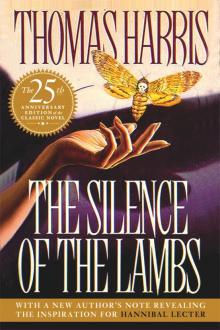 The Silence of the Lambs
The Silence of the Lambs Red Dragon
Red Dragon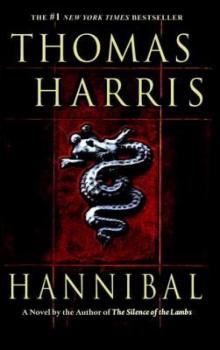 Hannibal
Hannibal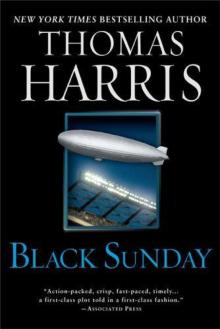 Black Sunday
Black Sunday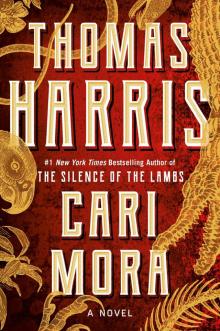 Cari Mora
Cari Mora Hannibal Rising
Hannibal Rising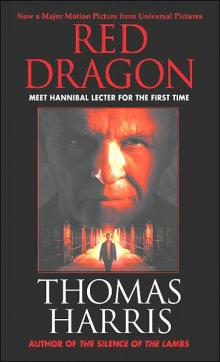 Red Dragon hl-1
Red Dragon hl-1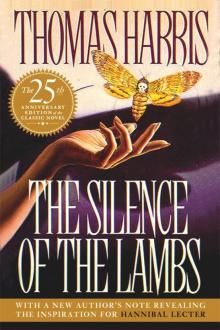 The Silence of the Lambs (Hannibal Lecter)
The Silence of the Lambs (Hannibal Lecter)